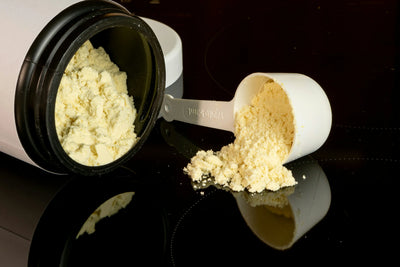Introduction
In order to relieve your dog's pain naturally, there are a number of herbs that can be used which are generally quite effective.
It is often difficult to recognize if a dog is feeling ill, but there are some signs that are quite common.
It is important to know how to recognize these signs and have a good idea of what to do if the animal is really uncomfortable.
Being very strong and used to different situations, puppies do not show as much intensity when in pain.
Despite this, often the guardian needs to take action to help. But do you know what to do and which herbs to use to relieve your dog's pain naturally?
Read this text with us to find out more!
Before looking for natural anti inflammatory for dogs, it is very important that you know what the main signs are that things are not going well.

Even if puppies can't talk, they give us indications about their health and mood all the time.
First of all, it's good to clearly point out that pain is a sign that the animal has some kind of health problem.
It could be a simple, passing situation, but it could also be something more serious that needs to be investigated.
Therefore, take your pet to the vet as soon as you think something is wrong.
Everything in this article is informational only and is not a substitute for consultation and treatment with a veterinarian.
Therefore, you should seek help whenever your pet shows signs of pain, where the main symptoms are:
- Faster, deeper or wheezing;
- Localized or generalized tremors;
- Arching of the spine or complete atrophy of the body;
- The animal becoming numb;
- Loss of appetite or complete anorexia;
- Crying or howling;
- One or more lame limbs;
- Pallor of mucous membranes (gums and eyes);
- Behavioral changes;
- Excessive salivation.
It is very important to have the help of a veterinarian who will properly recognize these signs and perform a thorough physical examination of the animal to determine what is wrong.
In addition, the professional should request additional tests, which will also help in the diagnosis and subsequent treatment.
Types of Pain in Dogs
It is important to realize that there are several types of pain that can occur in animals just as it does in humans.
Generally, this is a classification that takes into account the signs and veterinary diagnosis that the animal exhibits.
In the case of an animal experiencing trauma or surgery, the pain is considered acute. And if it evolves by chance and lasts for months, it is considered chronic.
There is another type of pain known as inflammatory. As the name suggests, this is a manifestation that arises in the presence of inflammation or infection.
There is also pathological pain, which is caused by dysfunction of the animal's nervous system, as in the case of autoimmune diseases.
Problems such as dysplasia and arthritis in turn lead to a painful condition known as neuropathic pain.
What Can I Do to Ease My Puppy's Pain?
Before giving your pet any medication, it is fundamental that you think that there is no way to solve any problem until you understand the possible causes.
First of all, if you notice that your little animal is very irritable because of the pain, you should try to calm him down.
Pet him, talk to him, and if he's a lap animal, you can pick him up to keep him warm and calm.
After making your pet more comfortable, take him to the vet immediately for a thorough clinical examination.
Animals don't talk, and although they express their feelings through their actions, it's impossible to determine his condition without a proper clinical examination.
Most Commonly Used Pain Relief Medications for Puppies
Most often, veterinarians will use common medications to provide immediate pain relief to an animal.
One of the most commonly used categories are anti inflammatory medications, some of which are well known.
Natural anti inflammatory for dogs are the most commonly used medications for pain caused by inflammatory processes, which is even the most common cause.
In some cases, it is necessary to combine them with other types of drugs.
It is necessary to be very careful when administering antibiotics to animals, since these drugs are potentially harmful and, ultimately, can be quite debilitating for the dog's health.
Obviously, there are situations where they are really indispensable in order to avoid problems such as serious infections.
In such cases, there is no way to use herbs to relieve pain and eliminate the disease naturally, but rather more drastic and effective treatments are needed.
How to Help a Dog Suffering from Stomach Pain?
It is very common for dogs to have stomach pains, in which case they lose their appetite and even experience vomiting and diarrhea.
Apathy is also common because in this case the animal is in pain and cannot move and play as usual.
If you find that these symptoms persist for a long time, you need to take the animal to a trusted clinic.
However, there are herbs that provide natural anti inflammatory for dogs. It is no wonder that animals usually graze on herbs in these cases of stomach pain.
For example, chamomile tea is a great natural option for helping critters that are feeling sick.
Ginger can also be a great help in these situations, as it is a digestive food.
Natural Stomach Ache Relief for Dogs
A number of herbs can help alleviate stomach problems, and it's worth knowing about some of them and even incorporating them into an animal's diet. The main ones are:
- Lavender: reduces anxiety and helps with painful processes, especially digestive pain;
- Bordeaux: an excellent laxative, helps reduce intestinal gas and also stimulates the liver to produce bile;
- Sacred Spirea: reduces stomach acid, thus relieving heartburn and reflux;
- Neem: relieves gastritis, improves immunity and regulates blood sugar;
- Peppermint: improves digestion and reduces congestion in the respiratory tract;
- Fennel: relieves intestinal discomfort caused by gas, as well as reducing anxiety.
Natural Pain Reliever for Puppies
Abdominal pain is also a very common sign in dogs which can be very uncomfortable.
Whether it is due to increased intestinal peristalsis or the formation of excess gas, the animal can feel very uncomfortable.
Special attention must be paid to the animal's diet.
If you have noticed that your pet has irregular bowel movements, you need to observe and try to determine the cause.
If this is a one-time event because it ate something specific, then try to make the animal drink water and also keep it off food for a while.

At the same time, think about the possible causes of the problem, keeping in mind that it usually occurs due to the following reasons:
- Nutritional deficiencies;
- Insect-borne diseases;
- Intestinal or stomach obstruction;
- Infection of the digestive tract.
Importantly, there may be some secondary disease behind these causes, so if the symptoms continue for more than two days or get worse, it's important to seek veterinary help.
However, if you realize that you can take care of your pooch at home using your dog's natural pain relief methods, then do so.
Applying hot compresses to the abdomen and drinking tea that aids in digestion will help. In addition, the diet should be light and controlled.
Treatment of Earache in Dogs
Itching in the ear area of the dog is very common and is usually accompanied by an unpleasant odor and redness.
Canine otitis occurs due to the colonization of the area by fungi and mites and is something that deserves the attention of the guardians.
Therefore, in addition to using the medications directed by your veterinarian, there are other methods that can be used.
Natural Anti Inflammatory for Dogs
As you can see, there are several types of natural anti inflammatory for dogs, and, these are widely used in veterinary medical practices.
However, these are quite strong medications and have significant side effects, so the best option is to really look for a natural pain relief for dogs.
Let's talk about some of the most important elements below:
Arnica Mona
Among natural pain relief methods for dogs, using arnica is the best option for those looking for a topical natural anti inflammatory for dogs.
The best way to use this herb is through a topical ointment containing plant extracts.
Be careful, however, as it must be appropriate for your pet and avoid any ingredients that could cause harm.
Another option is to use homeopathic remedies, known as Arnica 9CH. In this case, the medicine can be dissolved in water and given to the animal separately from food.
Turmeric
Turmeric is widely used as a culinary spice, but it also has some medicinal properties.
It is best known for its anti inflammatory abilities and is widely used as a natural alternative for dogs.
The dose for these animals should be 15 to 20 milligrams per kilogram of body weight per day. This ensures that the body has enough curcumin, the active principle responsible for pain relief.
Turmeric is best known for treating joint pain and inflammation and is a very widely used herb.
Studies on both humans and animals seem to confirm the many benefits of curcumin (one of the active ingredients in turmeric).
Judy Morgan, a U.S. veterinary surgeon and author of From Needle to Nature: learning holistic pet therapy, says curcumin is a powerful antioxidant. “Antioxidants neutralize free radicals that can cause painful inflammation and damage joints affected by arthritis.”
But high doses of turmeric can act as a blood thinner and cause stomach upset, so it's important to work with your veterinarian before giving your dog turmeric, Dr. Morgan says.
The recommended dose is 15 to 20 milligrams per kilogram of body weight," explains Dr Morgan. For every 10 pounds of body weight, this is about 1/8 to 1/4 teaspoon per day.”
Many veterinarians also recommend simply adjusting the human dose based on the dog's weight. For example, a 50-pound dog is about one-third the weight of a 150-pound person, so giving one-third the recommended dose is a reasonable starting point.
Fish Oil
One of the best options for relieving natural pain in dogs is fish, although there are other nutritional supplement options such as fish oil.
This is a therapeutic option used in cases of chronic pain that requires attention and treatment for several months.
It is best to use fish oil supplements that are rich in essential fatty acids, such as Omega 3, which is known for its excellent anti inflammatory properties.
Hot Water Bottle
That's right, and as simple as it sounds, using a localized heat source is a very effective way to treat pain in animals.
As with humans, you can apply a hot water bottle to the area of pain, and this usually reduces the symptoms considerably.
However, you must be very careful not to burn your pet's skin and end up making the problem worse.
Valerian
Valerian is another natural remedy for dog pain, just like it can be used for certain conditions in humans.
This is especially important for the inflammatory process that occurs due to muscle problems.
The plant is known for its ability to reduce the frequency and intensity of muscle contractures and the tension that can build up in the muscles.
Frankincense
Frankincense is very well known as the resin that exudes from the bark of the Boswellia carterii Birdw and its companion Boswellia bhaurdajiana Birdw, both of the olive family.
Recent laboratory studies have shown that frankincense can relieve pain. Dr. Jeremy Frederick of the Hudson Valley Advanced Equine Animal Hospital explains that it works by inhibiting the production of a specific type of leukotriene that regulates the immune response to inflammation.
Dr. Frederick says, “Although clinical studies in humans and animals are limited, in vitro studies have shown encouraging results and suggest a possible positive effect on the body as a whole.”
The compounds have no known side effects and can be used in human formulations to treat dogs as long as they contain no other compounds.
"The dosage varies depending on the size and age of the patient," says Dr. Frederick. Typically, treatment of a dog weighing 50 pounds should begin with 300 mg of Boswellia by mouth twice daily for two weeks, after which the dose is cut in half for ongoing maintenance.”
Cinnamon
Cinnamon is a medicinal herb that is often used as a spice sprinkled on top of coffee and cakes in the West, and even more so in almost all flavored spices in China.
There aren't enough veterinary clinical studies to prove whether or not cinnamon is useful for dogs, but according to Dr. Frederick, cinnamon can help with irritable bowel disease, stomach cramps, diarrhea, and other symptoms, and it can relieve pain and inflammation associated with joints.
That said, small human studies have shown that cinnamon has anti-inflammatory properties that can prevent or at least slow down the wear and tear of joint tissue. Cinnamon and many other natural anti-inflammatories have been mixed in some canine joint supplements in the United States.
As for how much cinnamon to feed your dog, Dr. Frederick says the dosage is variable because it depends on the size and age of the dog and the medical condition to be treated.
“For a 50-pound dog, adding 1/4 teaspoon of cinnamon powder to food twice a day for 2 weeks is safe and should show beneficial effects in reducing arthritis pain,” he explains.
One thing to keep in mind: while consuming cinnamon bark or powder may be safe for most patients, Dr. Frederick warns that it should be discontinued two weeks before any surgical procedure because it thins the blood and may increase the risk of bleeding.

Hawthorn
Hawthorn is also a Chinese herb and a delicious fruit, with the sugar-covered hawthorn berries inside the iceberg lettuce.
Hawthorn can also be a good choice for dogs with arthritis, according to US veterinarians.
Hawthorn is a popular choice among herbalists because of its cleansing properties. According to Dr. Morgan, who has studied how herbal methods help animals, pain occurs when blood stagnates in the body. She says, “Hawthorn reduces pain by moving the blood around, thus reducing pain.” Could this be the Chinese medicine concept of “if it moves, it doesn't hurt; if it hurts, it doesn't pass”?
Caveat: Dr. Morgan says hawthorn can interact with many prescription medications used to treat heart disease in pets, so don't feed your dog hawthorn if your pet is on heart medication.
Dr. Morgan explains, “Taking hawthorn with high blood pressure medications may cause a drop in blood pressure.”
Summary
It is extremely important to make it clear that care must be taken even when using natural anti inflammatory for dogs.
Here we talk about some safe options, but even then, you shouldn't do anything without first consulting your veterinarian.
Therefore, always use natural pain relief methods for dogs responsibly with the cooperation of a veterinary professional.





